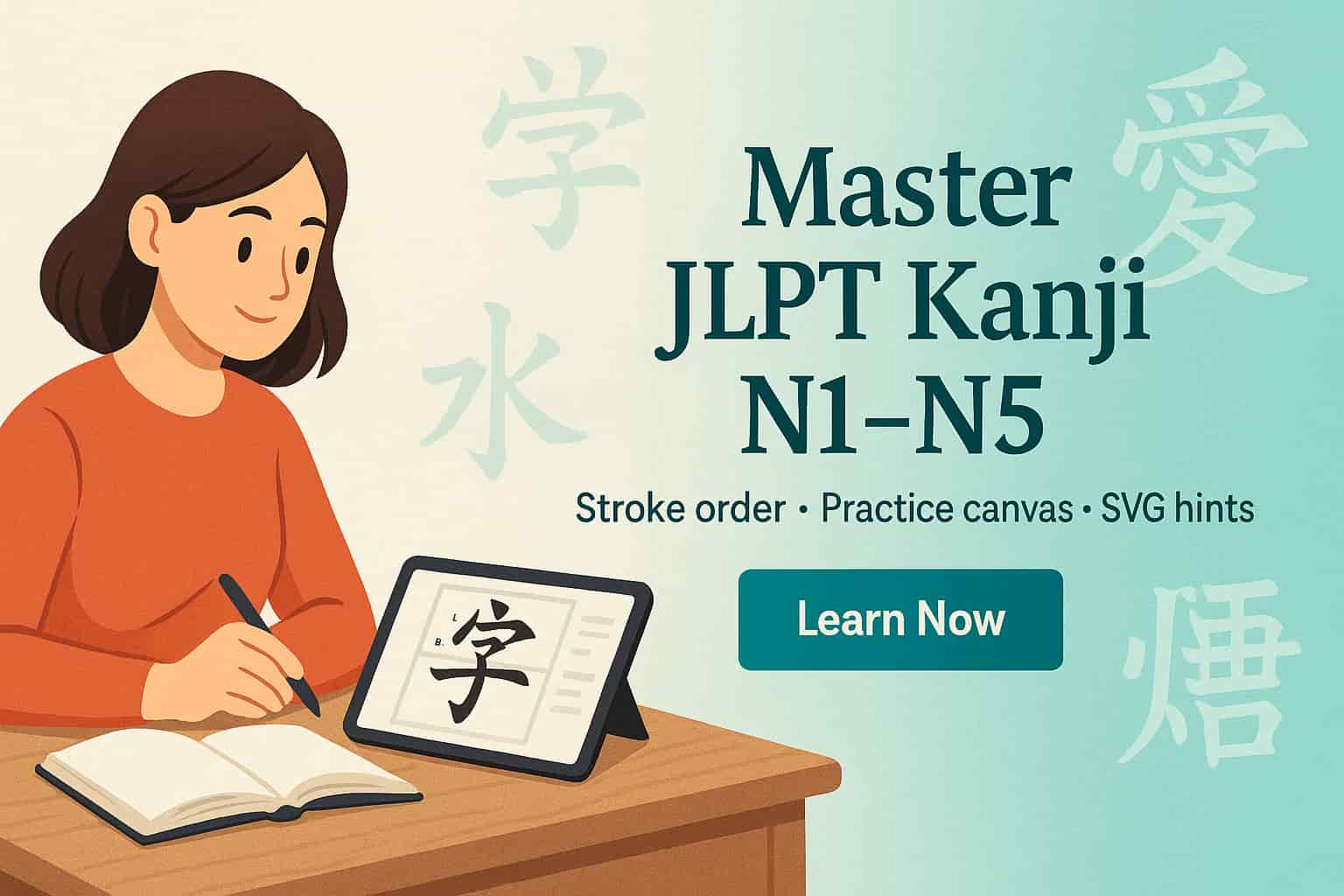Essential Japanese Words and Phrases Every Foreigner Should Know
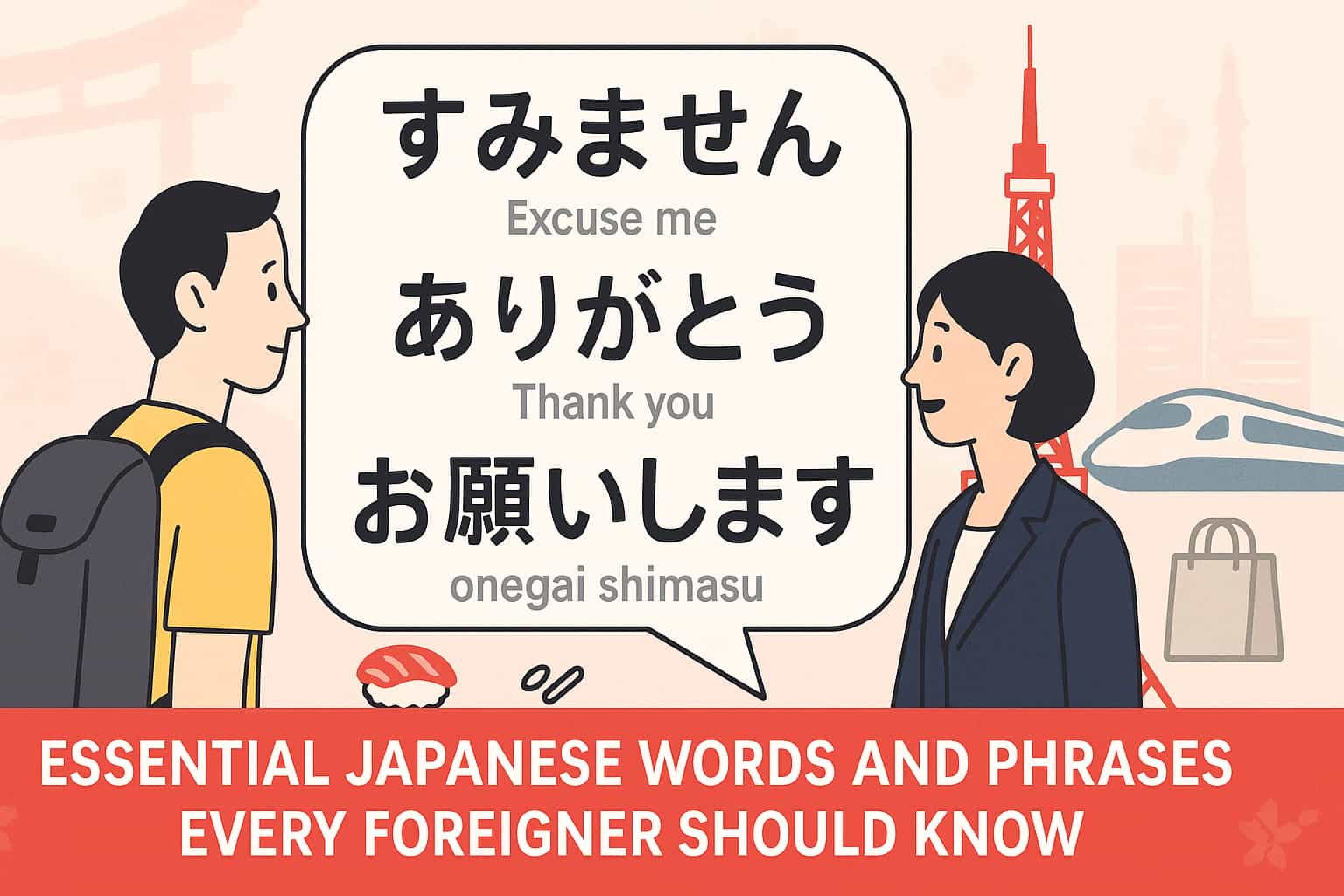
Moving to Japan can feel exciting and overwhelming at the same time. The good news? You don’t need perfect Japanese to navigate daily life. With a small set of high-impact words and phrases, you can order food, ask for help, and handle trains, shops, and the office with confidence. This guide focuses on real phrases you’ll actually say, with Kana/Kanji, Romaji, and clear English.
Politeness First: The Words That Open Doors
These soften requests and save you from awkward moments. If you memorize one section—make it this one.
すみません (sumimasen)
Excuse me / I’m sorry / Thank you (soft)
- Excuse me: すみません、駅はどこですか?
sumimasen, eki wa doko desu ka? — Excuse me, where is the station? - Sorry: すみません! (when bumping someone)
- Thanks: すみません、助かりました。
sumimasen, tasukarimashita. — Thank you, that helped.
お願いします (onegai shimasu)
Please (polite request)
- これ、お願いします。
kore, onegai shimasu. — This one, please. - 領収書、お願いします。
ryōshūsho, onegai shimasu. — Receipt, please. - 助けてください、お願いします。
tasukete kudasai, onegai shimasu. — Please help me!
ありがとうございます (arigatō gozaimasu)
Thank you (polite)
- Casual: ありがとう。 (arigatō)
- Polite: ありがとうございます。 (arigatō gozaimasu)
- Big gratitude: 本当にありがとうございます。
hontō ni arigatō gozaimasu. — Thank you so much. - Past tense (after receiving help): ありがとうございました。
arigatō gozaimashita. — Thank you (for what you did).
大丈夫です (daijōbu desu)
It’s okay / I’m fine / No, thank you
- 大丈夫です。 — No thanks / I’m fine.
- 大丈夫です、問題ないです。
daijōbu desu, mondai nai desu. — It’s fine, no problem. - 手伝いましょうか? (Shall I help?) → 大丈夫です。 (No, I’m okay.)
はい / いいえ (hai / iie)
Yes / No
- はい、わかります。
hai, wakarimasu. — Yes, I understand. - いいえ、大丈夫です。
iie, daijōbu desu. — No, it’s okay. - はい、お願いします。
hai, onegai shimasu. — Yes, please.
わかりません (wakarimasen)
I don’t understand
- すみません、日本語がわかりません。
sumimasen, nihongo ga wakarimasen. — Sorry, I don’t understand Japanese. - 英語はわかりますか?
eigo wa wakarimasu ka? — Do you understand English? - ちょっとわかりません。
chotto wakarimasen. — I don’t really understand.
いくらですか? (ikura desu ka?)
How much is it?
- これ、いくらですか?
kore, ikura desu ka? — How much is this? - 全部でいくらですか?
zenbu de ikura desu ka? — How much is it in total? - いくら払えばいいですか?
ikura haraeba ii desu ka? — How much should I pay?
トイレはどこですか? (toire wa doko desu ka?)
Where is the restroom?
- すみません、トイレはどこですか?
sumimasen, toire wa doko desu ka? — Excuse me, where is the restroom? - 近いトイレはどこですか?
chikai toire wa doko desu ka? — Where’s the nearest restroom? - 駅のトイレはどこですか?
eki no toire wa doko desu ka? — Where is the station restroom?
Survival Phrases for Daily Life
Use these in shops, convenience stores, apartments, and city streets.
| Japanese (Kana/Kanji) | Romaji | Meaning | Example phrase (Romaji + English) |
|---|---|---|---|
| トイレはどこですか? | toire wa doko desu ka? | Where is the toilet? | sumimasen, toire wa doko desu ka? — Excuse me, where’s the restroom? |
| いくらですか? | ikura desu ka? | How much is it? | kore wa ikura desu ka? — How much is this? |
| これをください | kore o kudasai | This one, please | kōhī, kore o kudasai. — Coffee, this please. |
| わかりません | wakarimasen | I don’t understand | sumimasen, nihongo wakarimasen. — Sorry, I don’t understand Japanese. |
| 英語は話せますか? | eigo wa hanasemasu ka? | Do you speak English? | sumimasen, eigo wa hanasemasu ka? — Excuse me, do you speak English? |
| ゆっくりお願いします | yukkuri onegai shimasu | Please speak slowly | mō ichido, yukkuri onegai shimasu. — One more time, slowly please. |
| 助けて! | tasukete! | Help! | tasukete! keisatsu! — Help! Police! |
| 大丈夫です | daijōbu desu | It’s okay / I’m fine | daijōbu desu, mondai nai desu. — It’s okay, no problem. |
| はい / いいえ | hai / iie | Yes / No | hai, onegai shimasu. — Yes, please. iie, daijōbu desu. — No, I’m fine. |
| 水をください | mizu o kudasai | Water, please | sumimasen, mizu o kudasai. — Water, please. |
| おすすめは何ですか? | osusume wa nan desu ka? | What do you recommend? | osusume wa nan desu ka? — What’s your recommendation? |
| 駅はどこですか? | eki wa doko desu ka? | Where is the station? | sumimasen, shinjuku-eki wa doko desu ka? — Excuse me, where is Shinjuku Station? |
| この電車は〇〇に行きますか? | kono densha wa ___ ni ikimasu ka? | Does this train go to ___? | kono densha wa tokyo ni ikimasu ka? — Does this train go to Tokyo? |
| 降ります | orimasu | I’m getting off | orimasu, sumimasen. — I’m getting off, excuse me. |
| チェックしてください | chekku shite kudasai | Please check | okaikei o chekku shite kudasai. — Please check the bill. |
| 領収書をください | ryōshūsho o kudasai | Receipt, please | ryōshūsho o kudasai. — Please give me a receipt. |
| コンビニはどこですか? | konbini wa doko desu ka? | Where is the convenience store? | sumimasen, konbini wa doko desu ka? — Excuse me, where is the convenience store? |
| 病院はどこですか? | byōin wa doko desu ka? | Where is the hospital? | byōin wa doko desu ka? — Where is the hospital? |
| 救急車を呼んでください | kyūkyūsha o yonde kudasai | Please call an ambulance | kyūkyūsha o yonde kudasai. — Please call an ambulance. |
| 警察を呼んでください | keisatsu o yonde kudasai | Please call the police | keisatsu o yonde kudasai. — Please call the police. |
| 道に迷いました | michi ni mayoimashita | I’m lost | sumimasen, michi ni mayoimashita. — Sorry, I’m lost. |
| 写真を撮ってもいいですか? | shashin o totte mo ii desu ka? | Can I take a photo? | koko de shashin o totte mo ii desu ka? — Can I take a photo here? |
| Wi-Fiはありますか? | waifai wa arimasu ka? | Do you have Wi-Fi? | sumimasen, Wi-Fi wa arimasu ka? — Excuse me, do you have Wi-Fi? |
| 分かりました | wakarimashita | I understood / Got it | wakarimashita, arigatō gozaimasu. — Got it, thank you. |
Best Tools for Learners
Mastering Japanese isn’t just about memorizing phrases—having the right tools makes learning smoother and faster. Here are some essential free tools that will help you handle writing, reading, and even dates with confidence.
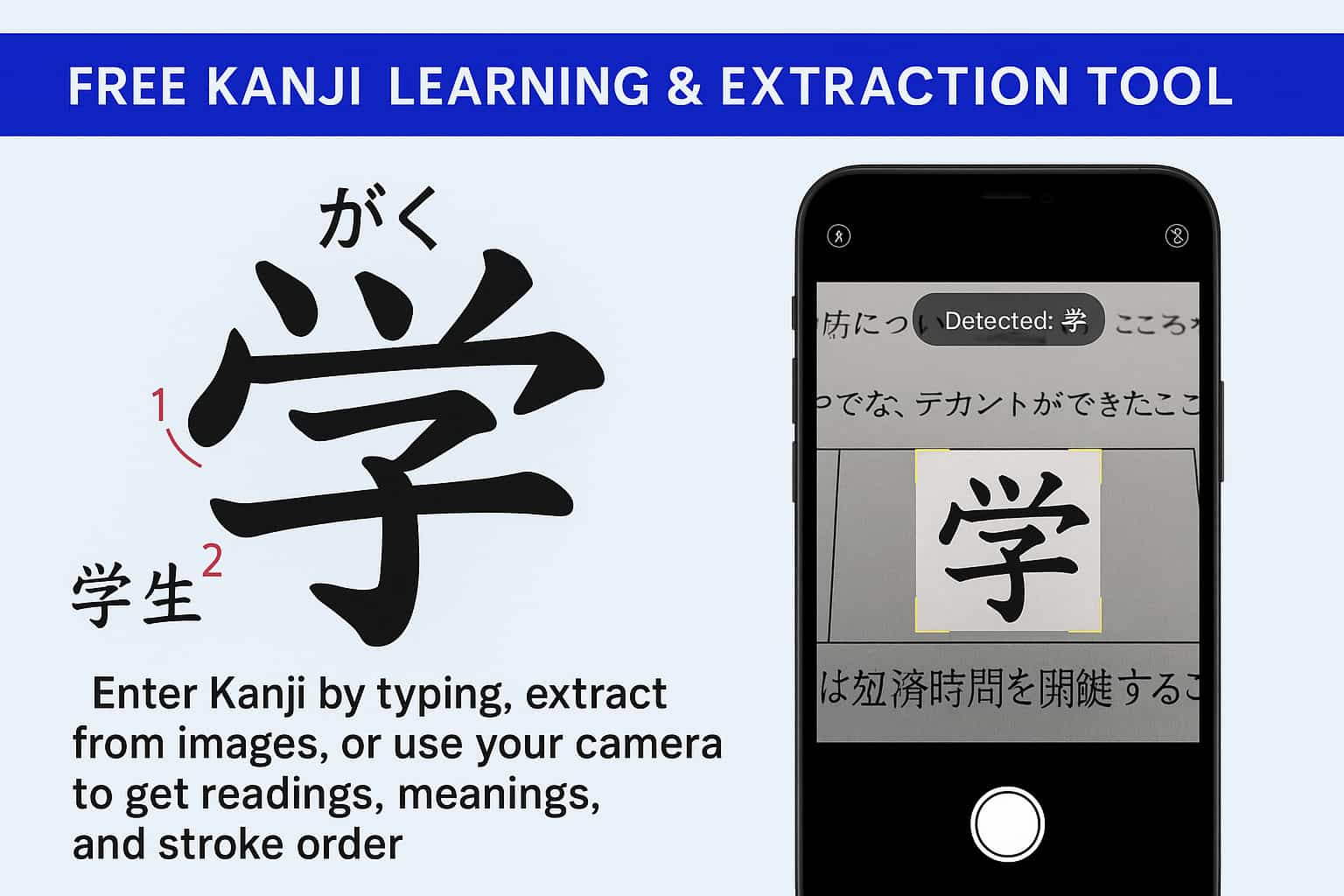
Kanji → Hiragana/Katakana Converter
Paste Japanese text with Kanji, and instantly convert it into easy-to-read Hiragana or Katakana. Perfect for beginners struggling with Kanji.
Try Now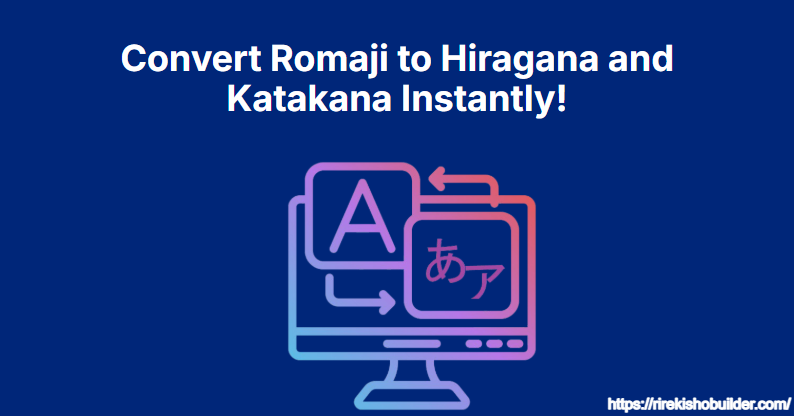
Romaji → Hiragana/Katakana Converter
Type Japanese words using English letters (Romaji), and convert them into Hiragana or Katakana instantly. Great for practice and accuracy.
Try Now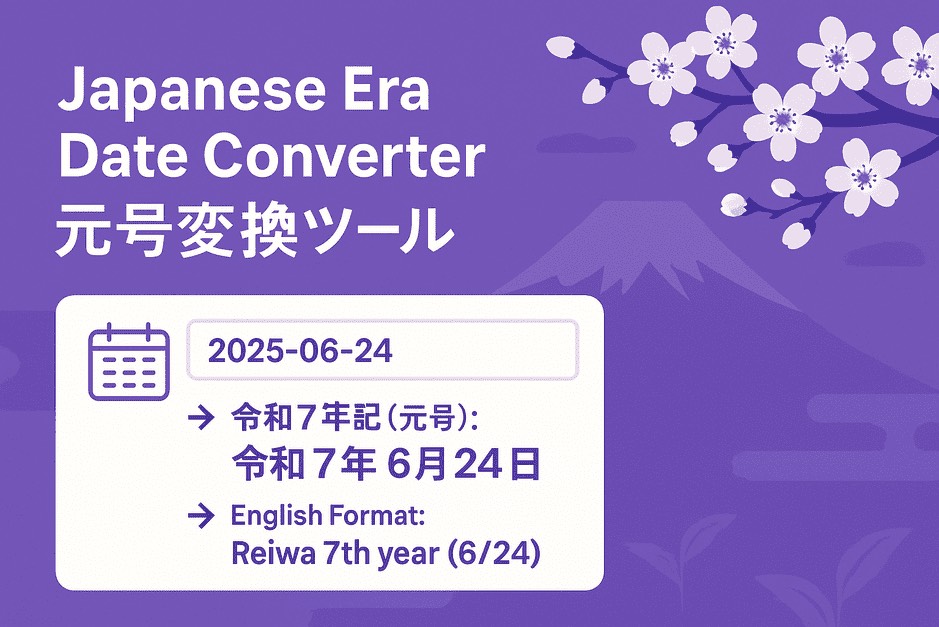
Japanese Era Date Converter
Easily convert Western calendar dates (e.g., 2025) into Japanese era format (Reiwa, Heisei, etc.). Very useful for forms, documents, and history study.
Try NowTransportation: Trains, Buses & Taxis
Japan’s public transportation is world-class, but it can feel overwhelming for newcomers. From trains with dozens of exits to crowded buses, a few phrases make it much easier to ask directions, confirm routes, or handle tickets and taxis.
〇〇駅はどこですか?
___-eki wa doko desu ka? — Where is ___ Station?
例: 新宿駅はどこですか?
shinjuku-eki wa doko desu ka? — Where is Shinjuku Station?
この電車は〇〇に行きますか?
kono densha wa ___ ni ikimasu ka? — Does this train go to ___?
Useful at the platform:
この電車は東京駅に行きますか?
kono densha wa Tōkyō-eki ni ikimasu ka? — Does this train go to Tokyo Station?
降ります
orimasu — (I’m) getting off.
Polite on a crowded bus:
orimasu, sumimasen — I’m getting off, excuse me.
いくらですか?
ikura desu ka? — How much is it?
Bus/taxi usage:
渋谷までいくらですか?
shibuya made ikura desu ka? — How much is it to Shibuya?
ICカードは使えますか?
IC kādo wa tsukaemasu ka? — Can I use an IC card?
Ask before boarding:
スイカは使えますか?
Suica wa tsukaemasu ka? — Can I use Suica?
〇〇までお願いします
___ made onegai shimasu — To ___, please.
When in a taxi:
ホテルニューオータニまでお願いします。
Hoteru Nyū Ōtani made onegai shimasu. — To Hotel New Otani, please.
切符をください
kippu o kudasai — A ticket, please.
At the counter:
大阪までの切符をください。
Ōsaka made no kippu o kudasai. — A ticket to Osaka, please.
どのくらいかかりますか?
dono kurai kakarimasu ka? — How long does it take?
Ask for travel time:
新大阪までどのくらいかかりますか?
Shin-Ōsaka made dono kurai kakarimasu ka? — How long does it take to Shin-Osaka?
終電は何時ですか?
shūden wa nanji desu ka? — What time is the last train?
Vital for nightlife:
新宿行きの終電は何時ですか?
Shinjuku-yuki no shūden wa nanji desu ka? — What time is the last train to Shinjuku?
Help & Emergencies
In an emergency, every second matters. Save these phrases and Japan’s emergency numbers in your phone or notes app. Calls to police, ambulance, or fire services are free of charge from mobile or landline phones.
- 助けて! — tasukete! — Help!
- 救急車を呼んでください。 — kyūkyūsha o yonde kudasai. — Please call an ambulance.
- 警察を呼んでください。 — keisatsu o yonde kudasai. — Please call the police.
- 火事です! — kaji desu! — There’s a fire!
- 事故です! — jiko desu! — There’s been an accident!
- 道に迷いました。 — michi ni mayoimashita. — I’m lost.
- 病院はどこですか? — byōin wa doko desu ka? — Where is the hospital?
- 英語を話せる人はいますか? — eigo o hanaseru hito wa imasu ka? — Is there someone who speaks English?
| Service | Number | Notes |
|---|---|---|
| Police (警察 / Keisatsu) | 110 | For crimes, theft, traffic accidents. Connects to nearest police station. |
| Ambulance & Fire (救急車・消防 / Kyūkyūsha, Shōbō) | 119 | For medical emergencies, serious injury, or fires. |
| Maritime Emergencies (海上保安庁 / Kaijō Hoanchō) | 118 | For accidents or emergencies at sea, coastal areas. |
You can dial these numbers from any mobile phone, payphone, or landline in Japan without a prefix. When calling, speak slowly: say your location (住所 / jūsho) and the situation (事故 / jiko = accident, 火事 / kaji = fire, etc.).
Shopping & Money: Cards, Receipts, Tax-Free
Shopping in Japan is smooth once you know the key words cashiers and staff always use. From bags and receipts to cashless payments, these phrases appear daily at convenience stores, supermarkets, drugstores, and clothing shops.
| Word | Romaji | Meaning | Example |
|---|---|---|---|
| 袋 | fukuro | Bag | 袋いりますか? — Do you need a bag? → はい、お願いします。 — Yes, please. → 大丈夫です。 — No, thank you. |
| ポイントカード | pointo kādo | Point card | ポイントカードありますか? — Do you have a point card? → あります。 — Yes, I do. → ないです。 — No, I don’t. |
| 領収書 | ryōshūsho | Receipt (formal) | 領収書、お願いします。 — Receipt, please. → Often used for business expense claims. |
| レシート | reshīto | Receipt (casual) | Cashiers hand it automatically, but you can ask: レシートください。 — Receipt, please. |
| 免税 | menzei | Tax-free | 免税できますか? — Is tax-free available? → Common in tourist shopping areas. |
| 電子マネー | denshi manē | E-money (Suica, Pasmo, PayPay, etc.) | スイカで。 — (Pay) with Suica. ペイペイで。 — With PayPay. カードで。 — With card. |
| 現金 | genkin | Cash | 現金で払います。 — I’ll pay in cash. お釣りはありますか? — Do you have change? |
| クレジットカード | kurejitto kādo | Credit card | クレジットカード使えますか? — Can I use a credit card? 分割できますか? — Can I pay in installments? |
| 試着 | shichaku | Try-on / Fitting | 試着できますか? — Can I try this on? → Clothing stores, shoe shops. |
| セール | sēru | Sale | セール中です。 — It’s on sale. セールはいつまでですか? — Until when is the sale? |
| お釣り | otsuri | Change (money back) | お釣りです。 — Here’s your change. お釣りありますか? — Do you have change? |
Food & Eating Out
Japanese restaurants, cafés, and convenience stores are usually easy to navigate with a smile and a few simple words. These phrases help you order confidently, explain dietary needs, and understand what staff are asking.
店内 / お持ち帰り
tennai = eat-in / omochikaeri = take-out
Staff: 店内ですか?お持ち帰りですか?
You: お持ち帰りで。 — Take-out, please.
水 / お冷
mizu / ohiya — water (tap water is free in most restaurants)
お冷、お願いします。 — Water, please.
Refill: お水のおかわりください。 — Another glass of water, please.
Allergy / Preference
- アレルギーがあります。 (arerugī ga arimasu.) — I have an allergy.
- 肉なしでお願いします。 (niku nashi de onegai shimasu.) — Please, no meat.
- 辛くしないでください。 (karaku shinaide kudasai.) — Please make it not spicy.
- ベジタリアンです。 (bejitarian desu.) — I’m vegetarian.
- ハラール対応していますか? (harāru taiō shiteimasu ka?) — Do you have halal options?
注文
chūmon — order
注文いいですか? — May I order?
これをください。 — I’ll take this one.
おすすめは何ですか? — What do you recommend?
お会計
okaikei — bill / check
お会計お願いします。 — The bill, please.
別々でお願いします。 — Separate checks, please.
What staff often say
- ご注文はお決まりですか? — Have you decided your order?
Reply: はい、これをください。 — Yes, I’ll have this one. - お待たせしました。 — Sorry to keep you waiting (when food arrives).
- ごゆっくりどうぞ。 — Please enjoy / Take your time.
Workplace Basics (Simple & Polite)
Short, polite phrases go a long way in Japanese workplaces. Use these in Slack/Teams, email, or face-to-face.
よろしくお願いします
yoroshiku onegai shimasu — Nice to work with you / Thank you in advance.
Reply when assigned a task or starting a project.
例: 本件、よろしくお願いします。 — Thank you in advance for this matter.
お疲れ様です
otsukaresama desu — Thanks for your hard work (standard greeting in chats/emails).
Open emails with this to sound natural.
確認お願いします
kakunin onegai shimasu — Please check/confirm.
例: 資料の最新版、確認お願いします。
少し時間をいただけますか?
sukoshi jikan o itadakemasu ka? — May I take a moment of your time?
Follow-up: 5分だけ大丈夫ですか? — Is 5 minutes okay?
もう一度説明していただけますか?
mō ichido setsumei shite itadakemasu ka? — Could you explain once more?
Soft opener: すみません、もう一度〜。
ありがとうございます。助かりました。
arigatō gozaimasu. tasukarimashita. — Thank you, that helped a lot.
Past-tense after they’ve finished something.
資料を共有します
shiryō o kyōyū shimasu — I’ll share the document.
例: こちらが最新版です。ご確認ください。 — Here’s the latest version. Please check.
締切の確認 / 延長依頼
締切はいつですか? — When is the deadline?
締切を延長できますか? — Could we extend the deadline?
○日までに提出します。 — I’ll submit by the __th.
失礼しました / 申し訳ありません
shitsurei shimashita / mōshiwake arimasen — I’m sorry (polite/formal).
例: 返信が遅れて失礼しました。 — Sorry for the late reply.
日程調整
○日の午後は空いています。 — I’m free on the afternoon of __.
この時間でいかがでしょうか。 — Would this time work?
別の時間をご提案いただけますか? — Could you suggest another time?
承認 / 判断
承認いただけますか? — Can we get your approval?
この方針で進めます。 — We’ll proceed with this plan.
ご意見あればお願いします。 — Please share any feedback.
不在・遅刻・在宅
- 本日は在宅勤務です。 — I’m working from home today.
- 10分ほど遅れます。 — I’ll be about 10 minutes late.
- 午後から不在です。 — I’ll be out this afternoon.
Email/Chat Openers & Closers
- お疲れ様です、[Name]です。 — Hi, this is [Name].
- いつもお世話になっております。 — Thank you for your continued support. (formal)
- 引き続きよろしくお願いいたします。 — Thanks in advance / Best regards.
- どうぞよろしくお願いします。 — Thank you and best regards. (softer)
Mini Phrasepacks for Common Situations
Copy-paste these into your phone and you’re ready for real life. These short packs cover common daily situations where a few key phrases can save time and reduce stress.
- 不在票が入っていました。 (fuzaihyo ga haitte imashita.) — I got a missed delivery slip.
- 再配達をお願いします。 (saihaitatsu o onegai shimasu.) — Please redeliver.
- 水道のトラブルです。 (suidō no toraburu desu.) — There’s a water issue.
- 鍵をなくしました。 (kagi o nakushimashita.) — I lost my key.
- 隣がうるさいです。 (tonari ga urusai desu.) — The neighbors are noisy.
- 必要な書類は何ですか? (hitsuyō na shorui wa nan desu ka?) — What documents are required?
- 記入例はありますか? (kinyūrei wa arimasu ka?) — Is there a sample form?
- 英語の対応は可能ですか? (eigo no taiō wa kanō desu ka?) — Is English support available?
- 印鑑が必要ですか? (inkan ga hitsuyō desu ka?) — Do I need a seal (hanko)?
- 住民票を取りたいです。 (jūminhyō o toritai desu.) — I’d like a copy of my residence certificate.
- 口座を開きたいです。 (kōza o hirakitai desu.) — I want to open an account.
- 両替できますか? (ryōgae dekimasu ka?) — Can I exchange money?
- 海外送金をしたいです。 (kaigai sōkin o shitai desu.) — I want to send money abroad.
- ATMが使えません。 (ATM ga tsukaemasen.) — The ATM isn’t working.
- 具合が悪いです。 (guai ga warui desu.) — I don’t feel well.
- 頭が痛いです。 (atama ga itai desu.) — I have a headache.
- 薬をください。 (kusuri o kudasai.) — Please give me medicine.
- 保険証は必要ですか? (hokenshō wa hitsuyō desu ka?) — Do I need my insurance card?
- 英語を話せる先生はいますか? (eigo o hanaseru sensei wa imasu ka?) — Is there a doctor who speaks English?
- 今、少しお時間ありますか? (ima, sukoshi ojikan arimasu ka?) — Do you have a moment now?
- 会議は何時からですか? (kaigi wa nanji kara desu ka?) — What time does the meeting start?
- ファイルを共有しました。 (fairu o kyōyū shimashita.) — I shared the file.
- 確認をお願いします。 (kakunin o onegai shimasu.) — Please confirm.
- 助かりました。 (tasukarimashita.) — That was a big help.
Conclusion
You don’t need thousands of words to live well in Japan. Start with politeness (すみません / お願いします / ありがとうございます), add a few survival lines (トイレはどこ/いくら/ゆっくりお願いします), and sprinkle in transport, shopping, and workplace basics. With this toolkit, you’ll be understood—kindly and clearly—almost everywhere you go.
